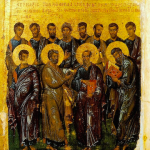Really? That’s one of the problems I have with the New American Bible translation endorsed and used exclusively in American Catholic Masses. A person didn’t have a fig tree. A man did. How do I know his gender? Easy, read:
“There once was a person who had a fig tree planted in his orchard,
and when he came in search of fruit on it but found none,
he said to the gardener,
‘For three years now I have come in search of fruit on this fig tree
but have found none.
So cut it down.
Why should it exhaust the soil?’
He said to him in reply,
‘Sir, leave it for this year also,
and I shall cultivate the ground around it and fertilize it;
it may bear fruit in the future.
If not you can cut it down.’” (Emphasis mine)
You see, the continued and repeated use of the masculine third person singular pronoun proves it was a he. I have no problem with translating Brothers as Brothers and Sisters when it is clear that the meaning was all people. I have no problem with translating Men to People when, again, the intent is the whole of humanity, male and female alike.
But this is a clear and flagrant case of appeasing the great PC brother. This is PC revisionism and nothing less. I know it’s a small, almost insignificant thing. So what Dave? Get a grip man! Who cares? Well, I care. Because, to be brutally honest, like so much that is modern PC censorship (and Heston was right, PC is simply censorship with increasingly diminishing manners), it is dishonest. Call it C.E. rather than A.D. all you want, but it still references the life and times of He Whose Name Cannot Be Mentioned.
And use ‘a person’ when it’s beyond clear that the individual is a man, and you’ve just been slightly less than honest, and that dealing with nothing less than Holy Scripture. Sometimes when Catholics call for a Church with more backbone, they’re smacked down and asked if they would want the Church to come down on them. Would I want the Church to come down that hard on me? Would I want the Church to say ‘it is as it is, suck on it’?
Well, yeah. For one thing, it has. After years pounding on the doors at Canossa Castle, I’ve been told there’s no room in the inn for former Protestant Clergy. At least not from my tradition. At least not for now. That’s that. It is what it is. For whatever reasons, whether I’m right or not in guessing what reasons might be, the winds have changed and are blowing in different directions than the ones that carried the Hahns and Grodis into a life of Catholic lay ministry, or even the Ray Rylands or the Longeneckers into ordained priestly ministry. But that’s what comes of being Catholic. It is what it is. The Church has spoken.
In my few years as a Catholic, I’ve gotten used to the Church saying it is as it is. So yes, I’d be happy to have the Church start saying it a little more across the board. Tell feminist sensitivities and progressives calling for radical change that they can deal with it. We don’t have to go and rewrite all of Scripture, even dishonestly, to appease them. Start telling it straight. You can’t say ‘take up your cross and follow the Savior’, only to turn around and start rewriting words like cross and Savior in the hopes of appealing to our post-modern generation. Take it from one who spent years along side mainline Protestants and denominations descended from the traditions of Bultmann and John Dominic Crossan, any attempts to compromise with a movement whose roots are diametrically opposed to the foundations of the Christian universe are doomed to fail, no matter how trivial the compromises first appear. Being less than sincere in our interpretations of Scripture in order to contribute to the failure is just heaping coals on an already burning flame.















